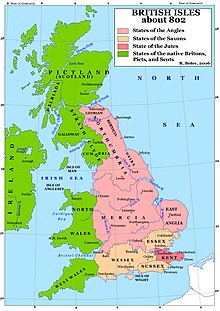Osbald
Osbald (also Osbaldus ; † 799 ) was an Ealdorman and in 796 briefly king of the Anglo-Saxon kingdom of Northumbria .
Life
Osbald's origin is unknown, but he and his family were involved in the succession disputes. He probably came from the Northumbrian royal family.
Osbald was first mentioned by chroniclers in 780 when he raised an army together with the Ealdorman Æthelheard and the patricius Bearn, a partisan of King deslfwald I (778 / 779-788), on December 24, 780 in Seletune (uncertain: Salton, in North Yorkshire ) burned. Osbald was a friend of Alkuin , an advisor to Charlemagne , who was considered the greatest scholar of his time, with whom he was also in contact by letters. Between 793 and 796, Alcuin wrote a letter to King Æthelred I (774–778 / 779 and 790–796) and Osbald, who now bore the title patricius , and warned them of injustice, robbery and an “unclean” lifestyle.
The Ealdormen Ealdred and Wada led a conspiracy which King Æthelred fell victim to on April 18, 796 in Cobre ( Corbridge ). Osbald was made his successor, presumably by the conspirators. After just 27 days he was deposed and had to flee. First he found asylum in the Lindisfarne monastery . A little later he fled with some monks by ship to the Picts , whose king Caustantín mac Fergusa (around 789-820) granted him refuge. His successor Eardwulf ascended the throne on May 14th and was elected on May 26th, 796 in York by Archbishop Eanbald I (around 780-796) and the bishops Æthelberht of Hexham (789-797), Higbald of Lindisfarne (780-803) and crowned Baldwulf of Whithorn (791-803). Possibly in 798 Osbald supported the revolt of Ealdorman Wada, who rebelled against Eardwulf. In this context another letter from Alcuin to Osbald can be seen, in which he admonished him to fulfill his oath, to go to the monastery and to renounce worldly life. Osbald complied with the request and died as abbot in 799. He was buried in St Peter's Minster in York.
The places Osbaldeston (Blackburn) and Osbaldwick (York) in Northumbria are named after Osbald .
swell
- anonymous: Anglo-Saxon Chronicle Online in Project Gutenberg (English)
- Symeon of Durham : De Gestis Regum Anglorum (Deeds of the English Kings)
- Alcuin : Epistolae (letters)
literature
- Barbara Yorke : Kings and Kingdoms of Early Anglo-Saxon England . Routledge, London-New York 2002, ISBN 978-0-415-16639-3 . PDF (6.2 MB)
- DP Kirby: The Earliest English Kings . Routledge, London-New York 2000, ISBN 978-0415242110 .
- David W. Rollason: Northumbria, 500-1100: Creation and Destruction of a Kingdom . Cambridge University Press, 2003, ISBN 978-0521813358 .
Web links
- David W. Rollason: Osbald (paid registration required). In: Oxford Dictionary of National Biography , Oxford University Press, 2004. Retrieved February 4, 2012
- Osbald 1 in Prosopography of Anglo-Saxon England (PASE)
- Osbald in Foundation for Medieval Genealogy
Individual evidence
- ↑ Simon Keynes: Kings of the Northumbrians . In: Lapidge et al. (Ed.): The Blackwell Encyclopaedia of Anglo-Saxon England . Wiley-Blackwell, Oxford et al. a. 2001, ISBN 978-0-6312-2492-1 , pp. 502-505.
- ↑ a b c d David W. Rollason: Osbald ( Memento of the original from May 22, 2010 in the Internet Archive ) Info: The archive link was inserted automatically and has not yet been checked. Please check the original and archive link according to the instructions and then remove this notice. (paid registration required). In: Oxford Dictionary of National Biography , Oxford University Press, 2004. Retrieved February 4, 2012
- ^ Barbara Yorke: Kings and Kingdoms of Early Anglo-Saxon England . Routledge, London-New York 2002, ISBN 978-0-415-16639-3 , p. 88.
- ^ Barbara Yorke: Kings and Kingdoms of Early Anglo-Saxon England . Routledge, London-New York 2002, ISBN 978-0-415-16639-3 , p. 93. see: Symeon von Durham: De Gestis Regum Anglorum for the year 780 and Anglo-Saxon Chronicle for the year 780.
- ^ A b David W. Rollason: Northumbria, 500-1100: Creation and Destruction of a Kingdom . Cambridge University Press, 2003, ISBN 978-0521813358 , p. 194.
- ^ Symeon of Durham: De Gestis Regum Anglorum for the year 799
- ^ Anglo-Saxon Chronicle for the year 795
- ↑ David Wilde: Osbaldwick: A village suburban
| predecessor | Office | successor |
|---|---|---|
| Æthelred I. |
King of Northumbria 796 |
Eardwulf |
| personal data | |
|---|---|
| SURNAME | Osbald |
| ALTERNATIVE NAMES | Osbaldus |
| BRIEF DESCRIPTION | King of Northumbria |
| DATE OF BIRTH | 8th century |
| DATE OF DEATH | 799 |
